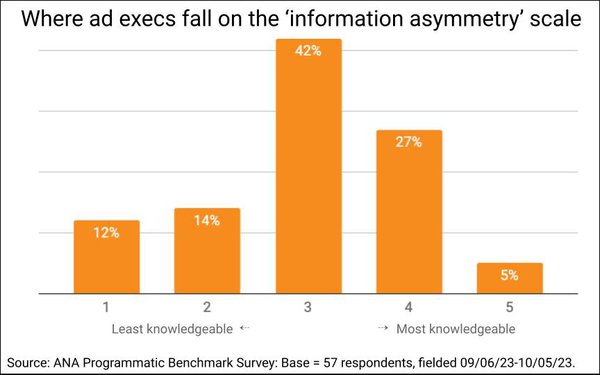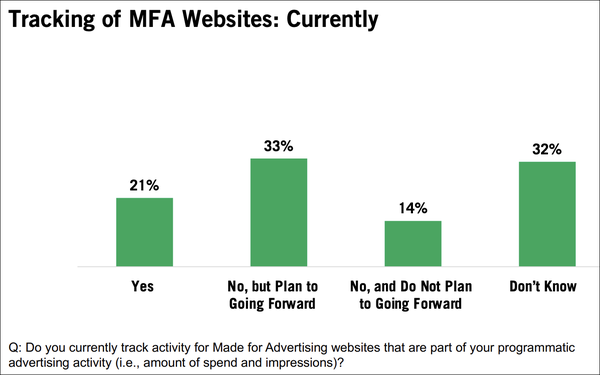Only A Third Of Ad Execs 'Knowledgeable' About Programmatic Buys
- by Joe Mandese @mp_joemandese, January 7, 2024

Asked where they fall on a theoretical scale in terms of their knowledge about the quality of their programmatic media buys, only a third of ad execs surveyed recently by the Association of National Advertisers rated themselves as somewhat or very knowledgeable.
The finding, which comes from the final edition of a year-long series of reports published by the ANA on the programmatic advertising supply chain's "transparency," is based on a survey of ANA members late last year who are explicitly involved with programmatic media buying.
Earlier editions already identified that the so-called "information asymmetry" between programmatic buyers and sellers was one of the chief issues plaguing the marketplace, and the year-end study shows the vast majority of ad execs do not feel confident about their relative knowledge about the quality of the ad inventory they buy programmatically.
advertisement
advertisement
"Information asymmetry is an imbalance in the nature and quality of information possessed by different parties in a transaction," the just-released ANA report notes, emphasizing: "When asked, 'Where is your company on the information asymmetry scale?' survey results are a bell curve." (See above.)
The study also reveals that only a minority of ad execs involved in programmatic media-buying track the number of websites they buy (46%), were aware of bogus "made-for-advertising" (MFA) sites before the ANA's reports (46%), and have been using log-level data to analyze their programmatic buys (42%).
On the bright side, the percentage of advertisers who actively track MFA sites jumped to 21% currently, from just 8% prior to the release of the ANA's studies. Moreover, a third said they plan to begin tracking MFAs going forward.




Thank you for your continued coverage of the ANA report!!! With barely over half of execs tracking or planning to track MFA, clearly education is vitally important.
There is a similar split of marketers who own their own contracts with measurement vendors and downstream partners. If you don't have legal access/control over your log files you will never close the information asymmetry gap.
Joe, I wonder how many "execs" they tried to get a response from as a 57 sample size seems like a very small one to be broken down as shown in the table. Are we talking a very low cooperation rate here? Also, what job functions were involved. For example, how many of the "execs" were media people versus brand managers, CMOs, etc. Finally, I wonder how many who claimed that they were well versed in programmatic could give a fairly correct description of what programmatic is and what it does and doesn't do?
@Ed Papazian: "Low" sample cooperation rates is relative when you're talking about the membership of an ad trade association (it's not like a nationally representative consumer survey).
Moreover, the ANA employed a screening process to ensure the ANA member respondents were in a position to be knowledgeable about programmatic media-buying.
Here's how it was done:
A survey was sent to 1,526 ANA client-side members who
have responsibilities for media management, and key highlights were integrated
into the report. The survey was in the field between September 6 and October 5.
There were 115 people who started the survey. After two screening questions,
92 people proceeded to the main questionnaire. As such, the results have a
95 percent confidence level with a ±10 percent error rate.
Joe, thanks for the clarification.
A few comments. First, assuming that they had a good list to start with, less than 10% actually responded. You can't figure cooperation rates based on those who started the questionnaire versus those who completed it. That doesn't make the results wrong but as a general rule when you go below 30% if securing cooperation---again, assuming that you start with valid names, addresses, etc. ---there is cause to worry about how representative the findings may be.
Second, there is no way to calculate the "error rate" of this or any survey if what is meant is whether the answers in aggregate are correct---based on sample size. All that standard error calculations give you are gambler's odds that if you repeat exactly the samke survey using exactly the same methods---rightly or wrongly---you may get the same answers.
In any event , you aswered one of my questions--about the job titles of thoose who were surveyed. Thanks.
Sorry about those typos in my reply, Joe. I was on the phone and typing while gabbing. Which brings up my old request----which, I believe is shared by many MP readers and posters. Now that we are starting out a new year what about providing an editing function ---like most other forums have? It would probably cause a hike in posts --and corrections to those posts---- which would, in my always humble opinion, benefit MP as well as its readers.